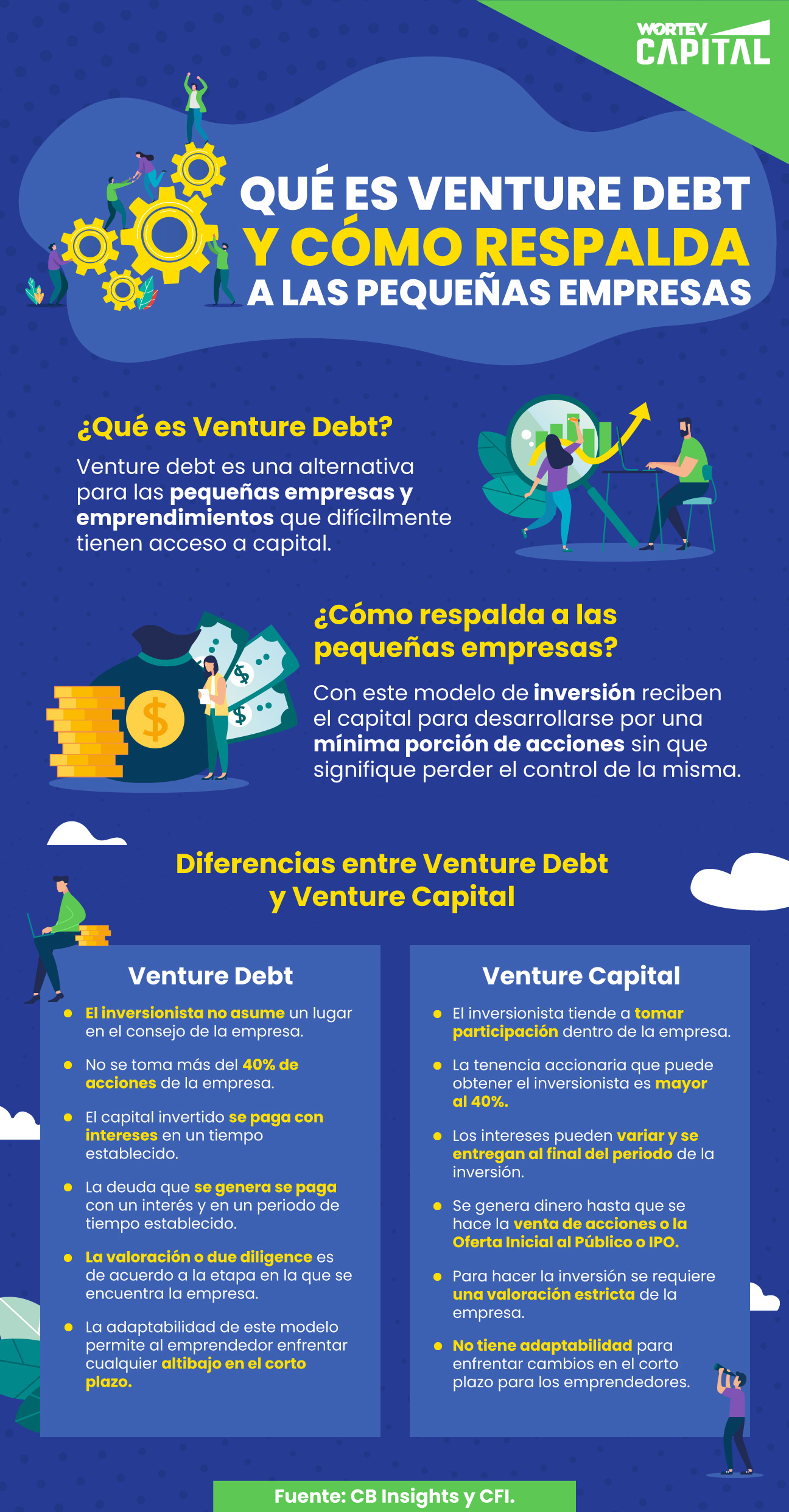One of the barriers an early-stage company faces is raising capital to validate its business model. With venture debt, these organizations find an alternative to obtain some type of capitalization.
First of all, what is venture debt? It is an alternative to obtain capital,very similar to venture capital,for those small businesses and ventures that, due to their low cash flow, have difficulty accessing capital.
points out that this investment model avoids a considerable shareholding decrease of investors and entrepreneurs obtain their capitalization.
You can also read: Why invest in an early stage company vs expansion?
How does the venture debt work?
With venture debt, the company obtains capital in exchange for a portion of shares and without the risk of losing control of it. A flexible investment model for this type of organization that can hardly access financing because at its stage they still do not have assets.
In the venture debt model, it does not take more than 40% of the company's shares, with which control of the company is not lost,and also offers flexibility to entrepreneurs with the intention of adapting to any challenge or unexpected market conditions.
In general, this type of investment is used when a company is in a very early or emerging stage and needs capital to face a strategy to launch a product, validate the business model, or start operations.
Why invest in venture debt?
Lluis Font, MBA Digital Transformation IEBS director, explains that it is an investment alternative in which the investor has the possibility of contributing capital to various projects and thus obtaining better results to grow their money.
It is also an opportunity to invest in small businesses or ventures, either with advice in the sector, or with capita and diversify your investment portfolio.
In recent years, the entrepreneurial ecosystem in regions such as Latin America has maintained sustained growth, which has led to investment models such as venture debt positioning themselves in the market.
The venture debt proposal represents a flexible alternative for both companies and investors, which is why each time it becomes a new ally of the ecosystem. According to figures from the Association for Private Equity Investment (LAVCA), investment in venture debt grew 13% in the first half of 2022.
You can also read: Mexican startups, what are their alternative investments to grow?
The venture debt model, like venture capital and private equity, is an alternative that encourages the entrepreneurial ecosystem globally. However, between each of them there are important differences such as:
Venture Debt
- venture debt issuers do not take a larger stake within the company. Usually they take a figure similar to a mentor.
- The capital injected into the company is paid with interest in a determined term.
- The valuation of the company or due diligence is according to the stage in which the company is located.
Venture Capital
- Private equity tends to take a stake in the company.
- Investors are often given a seat on the board of directors.
- Equity investments require a business valuation. There is usually a strict due diligence process.
Private Equity
- It is a growth investment, oor, in some cases, a restructuring of private companies.
- The capital obtained comes from institutional investors to pension funds with a medium to long-term strategy.
- At this stage, the company has the conditions to raise capital on the stock market or through a merger or acquisition.
Differences between venture debt and venture capital
Investments in venture debt and venture capital invest in companies with promising growth projections. Although both bet on this type of organization, there are differences between each one, according to CB Insights . CB Insights report.
In both types of investment for new companies with scalability potential without the founders of these companies losing control of them. However, between the two alternatives there are characteristics that differentiate them.
For example, the amount of capital that is allocated in venture debt is not as different from the amounts that are granted in the series that exist in the venture capital. Even capitalized companies return that capital at a certain time, unlike venture capital that buys back its shares, or goes on the stock market.
We list the main differences between venture debt and venture capital:


Any investment alternative responds to the investment needs of each small business and startups. Currently, the growth of alternatives such as venture debt funds trigger the development of more companies that hardly obtain capital with traditional models.
In Mexico, international venture debt funds invest in sectors that maintain a positive investment scenario, such as the fintech sector, one of the sectors that has grown the most in the last two years.
WORTEV CAPITAL as a venture capital firm has a pioneering model based on venture debt. With the aim of promoting the growth of more startups and small companies in sectors such as traditional and innovation that trigger economic growth.
The supply of funds to invest in venture capital and venture debt is still new in Mexico. However, WORTEV CAPITAL's investment model stimulates the entrepreneurial and economic ecosystem with a positive impact for everyone.
As part of its strategy, it allocates the capital and includes a nuclear accelerator to the company's operations to potentiate the development of more Mexican ventures.






